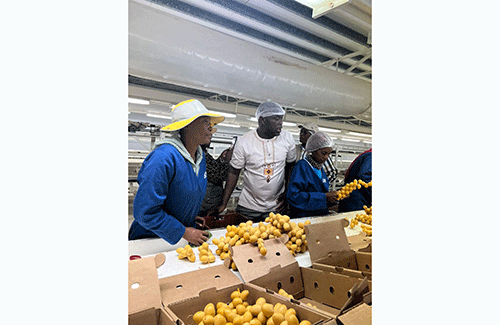NAUTE DAM – The parliamentary standing committee on natural resources this week visited the Naute Irrigation Project outside Keetmanshoop.
This was part of their mandate to obtain first-hand information and acquaint themselves with the operations,
achievement and challenges of the public agricultural sector.
The farm, operated by the Namibia Industrial Development Agency (Nida), consists of 2 000 hectares of agricultural land on which grapes are grown on 54ha, while dates are planted on 130ha. Prickly pears and pomegranates are also grown on the farm on a smaller scale on a 9.5ha piece of land. Grapes and dates are exported to foreign markets, whilst prickly pears and pomegranates are only destined for the local market at this stage.
When probed by committee member Ephraim Nekongo on the project’s marketing strategies, acting farm manager Simon Akwenye said “Nida partnered with South African marketing agency Rainbow Export to ensure grapes are reaching their European destinations, whilst dates are destined mostly for the Middle Eastern countries”.
The prickly pears and pomegranates are marketed and sold at the Nida head office in Windhoek. The farm manager added that plans are in an advanced stage to conclude a deal with a marketing agency to deal with the export of the dates. Akwenye said those grapes and dates not conforming to export standards are sold to the retail market
(mostly Ohlthaver & List group) and local vendors. On what impact rains have on production, he said the rainy season is coinciding with the period of harvesting fruits, which can have a negative influence on the production and quality of crops.
“Since rains are normally falling during November and December, which is also the time we are harvesting grapes while dates are ripening, the grape berries might burst open and the dates are developing loose skins, making it unfit for consumption, with Nida incurring a loss in production,” he noted.
He said when thunder and lightning accompanied rainstorms, employees cannot harvest the fruits.
Responding to committee member Herlinde Tjiveze’s concern on employee welfare, Akwenye said both permanent and seasonal workers are accommodated in hostels with access to electricity, clean drinking water and proper sanitation. The parliamentarian then advised him to consider approaching his head office to change from conventional electricity to solar energy as Namibia’s main electricity supplier Eskom (SA) might in the future not be able to do so anymore as they are already implementing load shedding in South Africa.
The chairperson of the committee, Vincent Mareka, probed the
farm manager on what happened to the produce not suitable for consumption.
“We send some to nearby Krystal Distillery, who use it for making gins and liquors, whilst we also dry some grapes for raisins. The rest are sold to farmers as animal fodder,” he responded. He explained some challenges experienced at the project as delayed procurement approvals, costs of operations pinned by fuel prices, and heavy rains sometimes destroying water infrastructure.
Nida is employing 57 permanent and 300 seasonal workers at the irrigation project. A total of 64 000 cartons of table grapes were exported this season to Europe, whilst 1 500 cartons of fresh dates have been sold so far.
Once the Namibia Standards Institution has set qualifying standards and also an
export permit has been obtained, prickly pears and pomegranates can be exported to foreign markets in the near future.


